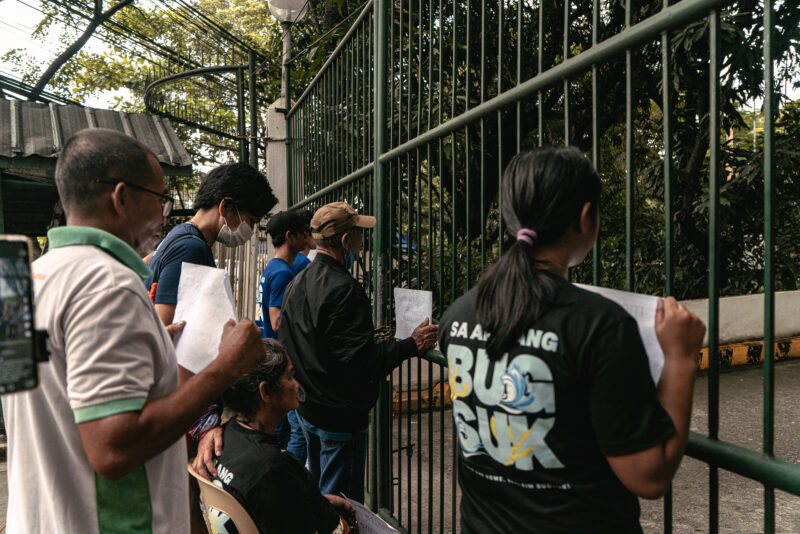“The mitochondria is the werpahouse of the cell.”
The popularity of the Facebook group “What’s your ulam, pare?” marks the comeback of a particular Filipino turn of phrase. Terms such as werpa, petmalu, and lodi are just a few examples of the evolution of Philippine colloquial language, or the informal words and phrases used in ordinary conversation.
Colloquial language has evolved and continues to evolve especially through the interconnectedness of technology. These colloquialisms have their own roles to play in Philippine society; but as time passes and vocabularies change, categorizations regarding language begin to blur.
Crossed words, crossed worlds
Much of Filipino colloquialism is centered around the linguistic technique of crossing or reversing sections of a word. In an interview with CNN Philippines, University of the Philippines Linguistics Professor Jay-ar Igno calls this manipulation the “tadbalik” technique. The term in itself is a play on the Filipino word baliktad, which means “in reverse” or “upside-down.”
He says that this technique has arisen from the creativity of Filipinos. “May kakayahan tayo mag-create o makabuo ng expression na produkto rin ng nage-exist na salita (We have an ability to create expressions and words out of existing words),” Igno explains.
“[Ang pagkamalikhain ay nagiging] daan upang magbiro, maglarawan, o kahit na mamintas (Creativity becomes an avenue for joking, description, and even criticism),” says Patricia Langitan, President of Baybayin, an organization that promotes Filipino culture.
This linguistic creativity may have been borne not just out of amusement. Our two official languages (English and Filipino) and the 180 other languages across the nation must continue to evolve to serve our incredibly diverse and evolving population’s need to express itself.
In modern times, these changes tend to cater to the different subgroups present in Philippine culture.
“Kagaya ng mga nagbabagong uso, ang wika ay nag-iiba depende sa kung ano ang mas itinatampok ng bawat grupo at henerasyon (Just like the changing trends, language evolves to accomodate every group and generation that uses it),” Langitan says.
Colloquialisms in the Philippines fall into the linguistic category of balbal, which refers to the street slang usage of particular subgroups.
The vocabulary of Philippine subgroups is vast and ever-changing. The usage of colloquialisms has changed drastically from how it was originally used as a revolutionary code in the 19th century.
“Katipuneros used secret codes in order to hide their identity and evade authorities. Writer-patriot Marcelo Del Pilar used the pen name ‘Plaridel,’ a jumbled version of his last name ‘Del Pilar,’” Roy Cagalingan of the Komisyon sa Wikang Filipino tells CNN Philippines.
Clearly, the evolution of colloquialisms has been long in the making, and is intricately tied to the meanings and expressions of those that speak it.
Double meanings
The regular Atenean is fluent in the art of presenting their individuality to peers and likewise acknowledging that of others. While this is evident in clothing and posture, linguistic theory states that it is more so apparent in the language we choose to speak.
“The moment I open my mouth, you already have an idea of what kind of person I am,” says Priscilla Angela Cruz, PhD, an assistant professor at the English Department who specializes in educational linguistics.
“Language is not an act of meaning that is separate from the context you’re in. The way you talk is not just your identity, but [it] is also how [your] identity is formed,” she says.
To explain this concept, Cruz brings forward the image of the typical kolehiyala, or an upper-middle class, private school-educated female college student. The aspects of her identity are clearly visible the moment she speaks. This can be identified through the language used (whether English or Filipino), as well as in the proficiency and the articulation of the individual.
The high level of proficiency and the ability to articulate and switch between English and Filipino are results of a complete ontogenesis, or the development of language.
“We tell stories, talk about history, explain things, report, argue, etcetera,” says Cruz, while pointing to a diagram of ontogenesis study. “You know when to use these [forms of dialogue] at certain times. If a person does not have access to the same education you do, there’s a chance that they will only be able to make some. So, the ontogenetic development is limited.”
In our society, individuals who have more opportunities to study have an abundance of linguistic options. However, individuals with limited access to education have a likewise limited set of linguistic options.
Few choice words
“Ang wika ay makapangyarihan (Language is powerful),” says Langitan. “Itinatatag nito ang identidad ng isang indibidwal at ng isang komunidad (It establishes the identity of an individual and a community).”
In the Philippine context, the political aspect of language is obvious. There is a hierarchy of language felt keenly nationwide, where English is more highly regarded than Filipino.
This is obvious in every Filipino who feels inferior for not being fluent English speakers, and in every occasion that Filipino languages other than Tagalog have been mistakenly categorized as “dialects.”
The use of colloquialisms, however, is interesting both culturally and socially. Colloquialisms are instances of identity that, like a badge, connect someone to a particular community.
“Ang pagtingin nang mababa sa wikang kolokyal at balbal ay kadalasan na isang pahiwatig na ang tumitingin dito ay nasa mas mataas na estado. Ito ay dahil ito ay hindi nagiging angkop sa kanilang pang-araw-araw na pamumuhay at ipinapakita nito ang kaibahan ng isang tao mula sa isa (Looking down upon colloquial language or balbal is often symptomatic of the higher social classes. This happens because [colloquialism] is not appropriate in their everyday context, and further highlights the differences between people),” Langitan says.
There is a perception in Filipino society that “jologs speech,” another name for Filipino colloquialisms that originate from and populated by the lower classes, is the language of the undereducated. Cruz rejects this idea.
“The fact that they speak [this] speech to each other also excludes [English speakers], and that is power to them as well,” she says.
Theory allows us to see at least one of the roots of tension: Exclusion. Colloquialisms serve as language for certain communities that, by their very nature, embraces members, but also excludes others. Similarly, it is this sense of community linked to colloquialisms that separates the Atenean who attempts to use the language from members of a group who have only this language.
“Power is about choice,” says Cruz. “We’re Ateneans. I can choose to talk ‘jologs’ speech, but that doesn’t mean I’m in that context and I’m bound to that context. We have the choice to talk in different ways and different variations of language and that’s what separates somebody who has power from someone who doesn’t. Power is also an access.”
What do you think about this story? Send your comments and suggestions here: tgdn.co/2ZqqodZ







